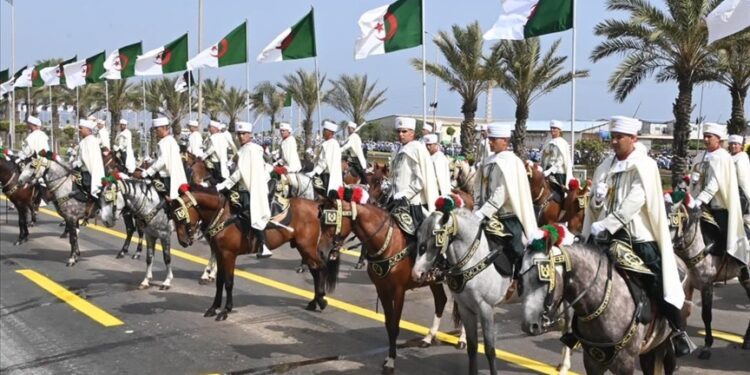ISTANBUL
Another diplomatic storm is brewing between Algeria and France, with analysts warning of a deepening crisis driven by shifting political landscapes, the rise of the French far-right, and unresolved colonial-era grievances.
In early April, Algeria expelled 12 staff from the French Embassy in Algiers in retaliation for the arrest of an Algerian consular employee in Paris. The employee was accused of involvement in the kidnapping of Algerian opposition influencer Amir Boukhors.
France responded by expelling 12 Algerian diplomats and recalling its ambassador for consultations.
Zine Labidine Ghebouli, a consultant and scholar on Euro-Mediterranean cooperation and Algerian politics at the Arab Reform Initiative, described the tit-for-tat expulsions as “mutual” and “unprecedented,” arguing they reflect a much deeper and long-standing crisis.
“The official reasons are manifestations of a deeper crisis related to the shift of the French political class, especially after the win of the French far right in the recent elections and the desire of the new Algerian leadership, since its arrival in 2019, to recalibrate its historically complex dynamics with France,” Ghebouli said.
“In reality, the ongoing tensions are reflective of both countries’ attempts to reach a new cooperation framework at a time of severe regional geopolitical shifts and shifting domestic interests.”
Turbulent legacy
France ruled Algeria for 132 years — from July 5, 1830, until Algeria declared independence on the same date in 1962. More than 1.5 million Algerians were killed during the brutal struggle for liberation, while hundreds of thousands were wounded, displaced, or went missing.
More than six decades later, analysts say colonial wounds remain open.
Paul Smith, a historian specializing in 19th- and 20th-century French politics, likens the relationship to a “roller coaster” and a “long-term crisis which has never really been resolved” since independence.
He noted that recent tensions have also been inflamed by France’s perceived support for Morocco in the Western Sahara dispute, a longstanding point of contention with Algeria.
The conflict over Western Sahara began in 1975 after Spain withdrew from the territory. Morocco claims sovereignty, offering autonomy under its rule, while Algeria supports calls for self-determination by the pro-independence Polisario Front.
In October, French President Emmanuel Macron told Morocco’s Parliament he supports Moroccan sovereignty over the region, prompting strong reactions in Algiers.
“It’s made Algeria very uneasy and unhappy about its relationship with Paris,” said Smith, who is an associate professor of French politics at the University of Nottingham.
Still, he noted occasional signs of rapprochement, including a phone call between Macron and President Abdelmadjid Tebboune in March and a visit to Algiers by French Minister of State for Europe Jean-Noel Barrot in April.
“It is a very complicated relationship between France and Algeria, and I don’t see an easy solution,” Smith said.
Far-right politics at play
Analysts warn that the French far right is exploiting the tensions for political gain, particularly ahead of key elections, with Algeria often been treated as an issue of domestic politics.
“The far right is certainly capitalizing on the current crisis to bolster its chances ahead of upcoming elections,” said Ghebouli.
He added that there are elements in both countries who oppose reconciliation for their own reasons.
“The challenge will be for the leaderships in both capitals to reach a reconciliation that bypasses these radical poles and safeguards national interests and the rights of at least 5 million people who enjoy a shared identity, including Algerian immigrants, French Algerians and French citizens of Algerian origins,” said Ghebouli.
Looking ahead to the 2027 presidential elections, Ghebouli warned that bilateral ties could remain hostage to political calculations in Paris.
“Without sustainable solutions on key dossiers of memorial cooperation, clandestine migration and the fate of French-Algerian author Boualem Sansal, the situation will keep escalating until 2027,” he said. Algerian authorities arrested Sansal in November at Algiers Airport, accusing him of undermining the country’s territorial integrity through his criticism of Algerian authorities.
Diaspora caught in the middle
Experts also fear the diplomatic fallout could have serious repercussions for the large Algerian diaspora in France.
Despite reassurances from both sides, “the Algerian diaspora is at the heart of current tensions,” said Ghebouli.
He cited concerns over the possible amendment or abolition of the 1968 bilateral accords governing Algerian migration to France.
“The overall sociopolitical climate has turned Algerians into a topic of public debate,” he said. “If the diplomatic tensions worsen between the two countries, the diaspora may suffer direct and heavy consequences related to transportation links, visas, settlement opportunities for Algerians in France, not to mention the impact on the significant human links between the two sides.”
Smith said the French far right has long used Algerians as a scapegoat in immigration debates.
He pointed to remarks by Interior Minister Bruno Retailleau, who framed Algeria and people of Algerian origin in France as an easily “identifiable other.” The right and extreme right wing, meanwhile, profile Algerians as being “the pinnacle of a wider problem.”
Strained economic ties
While Algeria and France have historically maintained strong economic ties, with bilateral trade reaching $11.8 billion in 2023, experts disagree on how much the current tensions will affect business.
“Many French companies have lost valuable access to the Algerian market in recent months,” Ghebouli said. “The future of economic cooperation in areas like industry, agriculture and tech is also questionable if tensions persist … the business class from both countries will increasingly feel the burden.”
Smith, however, argued that economic pragmatism will likely prevail.
“What happens at the diplomatic level and at the level of rhetoric actually doesn’t necessarily match what’s happening economically,” he said. “France needs Algerian gas. So that relationship … it’s very important that those things carry on.”






